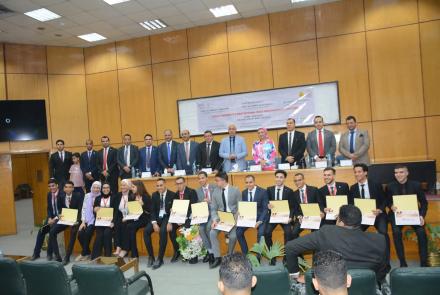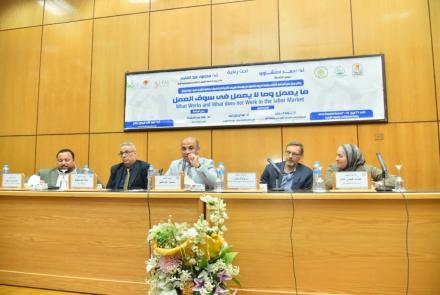The professional programs forum at Assiut University discusses digital governance and administrative reform through specialized sessions and a seminar with students of professional programs
Under the supervision of Dr. Ahmed El-Minshawy, president of Assiut University, specialized sessions were held within the activities of the second scientific forum for professional programs at the Faculty of Commerce, under the title" institutional reform and digital governance to support the building of the Egyptian state", in the presence of Dr. Ahmed Akkawi, president of South Valley University, Dr. Saleh al-Sheikh, Professor of Public Administration at Cairo University, former head of the central organization and administration authority, and Dr. Alaa Abdel Hafiz, dean of the Faculty of Commerce.
Dr. Ahmed El-Minshawy praised the rich and diverse scientific sessions in the forum's topics, which dealt in depth with the issues of digital governance, institutional reform and the development of administrative performance, stressing that they represent a model of integration between academic research and practical application, and reflect the awareness of participants of current challenges and development prospects. He also praised the panel discussion that brought together students of professional programs from the master's and doctoral levels, for their outstanding experiences and vivid testimonies about the effectiveness of courses in developing applied skills and supporting professional abilities, which embodies the role of the University in preparing cadres capable of effectively contributing to the development process and building a modern state.
The forum was organized by the Department of Graduate Professional Programs at the College of Commerce, in cooperation with the scientific committee of the College Students ' Union, and under the supervision of: Dr. Ahmed Abdulmoulaa, vice president for education and Student Affairs, Dr. Jamal Badr, vice president for graduate studies and research, Dr. Mohammed Ahmed Adawi, vice dean of the College of Commerce for education and Student Affairs, and Dr. Nesma Heshmat, vice dean of the College of Commerce for graduate studies and research.
The conference also witnessed the participation of vice presidents of Assiut University, vice presidents of a number of Egyptian universities, deans of colleges, their proxies, faculty members of Egyptian universities, coordinators of student welfare and student activities at the University.
A session entitled: financial governance and enhancing the performance of the government apparatus was held, chaired by Dr. Ahmed Ashraf, former undersecretary of the College of Commerce for community service and environmental development, and Dr. Mohammed Abdul Azim Talab, professor of Economics and public finance at the College, commented on the research of the session.
The session included a research by Dr. Walid Kamel Allam, undersecretary for graduate studies and research at the Faculty of Commerce, Aswan University, entitled: digital transformation as one of the mechanisms for applying financial governance and its impact on enhancing the competitive advantage of banking services-an applied study on the banking sector in the south of Upper Egypt, and aimed to identify the digital transformation strategy, spreading its culture, and human, technical and procedural requirements, from the point of view of customer service officials in the banking sector in the south of Upper Egypt.
Dr. Walid Kamel recommended the need to build a clear strategy for digital transformation that is objective and applicable, and the need to use digital transformation mechanisms to protect customer data, reduce the cost of banking services, and achieve creativity, flexibility and speed in providing them.
The session also included a paper by Dr. Ahmed Abdel Wahab, director general of legal affairs at the central administration of Fayoum tax region, entitled: modernization of organizational structures in Egypt and institutional reform, in which he addressed the components of institutional reform, including: developing structures, capacity building, implementing good governance, and promoting innovation.he also addressed the components of digital governance, including: digital transformation, digital infrastructure development, data security, and enhancing community participation through modern digital platforms.
The research presented practical steps to achieve institutional reform and digital governance, including: developing a comprehensive national reform plan, allocating the necessary resources, enhancing transparency, and periodically evaluating the results of the reform.
Commenting on the session, Dr. Mohamed Abdul Azim Talab praised the clarity of the research objectives, the suitability of the methodology used, and the applicability of the recommendations, thanking the researchers for their keenness to participate effectively in the forum.
A session entitled: Digital Governance to support government policies was also held, chaired by engineer Ayman Ayad, director of the Information Technology Institute branch at Assiut University, during which Dr. Heba Saleh, head of the Information Technology Institute at the Ministry of communications, and Dr. Tayseer Abdul Hamid, dean of the Faculty of computers and information, spoke online.
Dr. Heba Saleh presented a research entitled: from data to insight-towards more efficient, fair and secure institutional decision-making, during which she emphasized the spread of digitization in various government sectors, especially in the field of distance education, which appeared its importance during the corona pandemic, a crisis that also showed the importance of linking hospital databases to each other, and how to manage economic institutions remotely.
She also stressed the Institute's keenness to enrich the content of its various training programs with all the latest developments needed by the labor market, as well as its keenness to use artificial intelligence tools in developing the services it provides to more than (8000) graduates annually, starting from providing technological knowledge, up to simulating job interviews in major companies locally and internationally.
Dr. Tayseer Abdul Hamid presented a paper entitled: Digital Governance to support government policies, in which she stressed the importance of digital governance, not only in the provision of services, but in public policy-making, evaluation and development, so that the government is better able to face contemporary challenges, enhance citizens ' confidence, meet their aspirations efficiently and transparently, as well as building more inclusive and sustainable societies.
It presented models that illustrate the role of digital governance in supporting state-building, such as the digital Egypt platform, which provides more than (150) an electronic service for citizens in cooperation with various Ministries, a model for electronic linking between government agencies, as well as digital governance initiatives in health policies (using technology to support public health), along with many economic models to support youth projects, and businessmen.
Commenting on the session, engineer Ayman Ayad stressed the importance of the two researchers who explained the need to master digitization and artificial intelligence technologies, through training on them, and use them in supporting institutional decisions and public policies.
Within the framework of the activities of the fourth session, a seminar was organized with the participation of a number of students in the professional programs at the master's and doctoral levels, which was moderated by Dr. Mohammed Nadi Al-abysshi, a teacher at the Department of Business Administration at the Faculty of Commerce, where the participants reviewed their most prominent practical experiences and opinions about the extent of their benefit from the courses and their application in their administrative fields.
The participants were unanimous on the great positive impact left by the professional programs in developing their thinking methods, enhancing their applied skills according to scientific foundations and adopting innovative solutions, pointing out that the curricula and courses they received contributed to improving their job performance and supporting their abilities in the fields of institutional reform and digital governance, in line with the requirements of building the modern Egyptian state.
The students also expressed their deep thanks and appreciation to Assiut University for providing the opportunity to enroll in these qualitative programs aimed at keeping pace with the needs of the labor market and enhancing the levels of competitiveness and productivity in various institutions.






